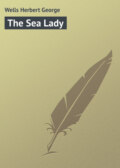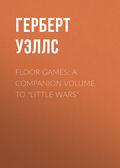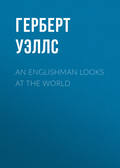
Герберт Джордж Уэллс
Mr. Britling Sees It Through
§ 6
In that computation he reckoned without Hugh.
Within a month Hugh was also saying "Good-bye."
"But how's this?" protested Mr. Britling, who had already guessed the answer. "You're not nineteen."
"I'm nineteen enough for this job," said Hugh. "In fact, I enlisted as nineteen."
Mr. Britling said nothing for a little while. Then he spoke with a catch in his breath. "I don't blame you," he said. "It was – the right spirit."
Drill and responsibilities of non-commissioned rank had imposed a novel manliness upon the bearing of Corporal Britling. "I always classified a little above my age at Statesminster," he said as though that cleared up everything.
He looked at a rosebud as though it interested him. Then he remarked rather casually:
"I thought," he said, "that if I was to go to war I'd better do the thing properly. It seemed – sort of half and half – not to be eligible for the trenches… I ought to have told you…"
"Yes," Mr. Britling decided.
"I was shy about it at first… I thought perhaps the war would be over before it was necessary to discuss anything… Didn't want to go into it."
"Exactly," said Mr. Britling as though that was a complete explanation.
"It's been a good year for your roses," said Hugh.
§ 7
Hugh was to stop the night. He spent what seemed to him and every one a long, shy, inexpressive evening. Only the small boys were really natural and animated. They were much impressed and excited by his departure, and wanted to ask a hundred questions about the life in the trenches. Many of them Hugh had to promise to answer when he got there. Then he would see just exactly how things were. Mrs. Britling was motherly and intelligent about his outfit. "Will you want winter things?" she asked…
But when he was alone with his father after every one had gone to bed they found themselves able to talk.
"This sort of thing seems more to us than it would be to a French family," Hugh remarked, standing on the hearthrug.
"Yes," agreed Mr. Britling. "Their minds would be better prepared… They'd have their appropriate things to say. They have been educated by the tradition of service – and '71."
Then he spoke – almost resentfully.
"The older men ought to go before you boys. Who is to carry on if a lot of you get killed?"
Hugh reflected. "In the stiffest battle that ever can be the odds are against getting killed," he said.
"I suppose they are."
"One in three or four in the very hottest corners."
Mr. Britling expressed no satisfaction.
"Every one is going through something of this sort."
"All the decent people, at any rate," said Mr. Britling…
"It will be an extraordinary experience. Somehow it seems out of proportion – "
"With what?"
"With life generally. As one has known it."
"It isn't in proportion," Mr. Britling admitted.
"Incommensurables," said Hugh.
He considered his phrasing. "It's not," he said, "as though one was going into another part of the same world, or turning up another side of the world one was used to. It is just as if one had been living in a room and one had been asked to step outside… It makes me think of a queer little thing that happened when I was in London last winter. I got into Queer Company. I don't think I told you. I went to have supper with some students in Chelsea. I hadn't been to the place before, but they seemed all right – just people like me – and everybody. And after supper they took me on to some people they didn't know very well; people who had to do with some School of Dramatic Art. There were two or three young actresses there and a singer and people of that sort, sitting about smoking cigarettes, and we began talking plays and books and picture shows and all that stuff; and suddenly there was a knocking at the door and some one went out and found a policeman with a warrant on the landing. They took off our host's son… It had to do with a murder…"
Hugh paused. "It was the Bedford Mansions mystery. I don't suppose you remember about it or read about it at the time. He'd killed a man… It doesn't matter about the particulars anyhow, but what I mean is the effect. The effect of a comfortable well-lit orderly room and the sense of harmless people – and then the door opening and the policeman and the cold draught flowing in. Murder! A girl who seemed to know the people well explained to me in whispers what was happening. It was like the opening of a trap-door going down into some pit you have always known was there, but never really believed in."
"I know," said Mr. Britling. "I know."
"That's just how I feel about this war business. There's no real death over here. It's laid out and boxed up. And accidents are all padded about. If one got a toss from a horse here, you'd be in bed and comfortable in no time… And there; it's like another planet. It's outside… I'm going outside… Instead of there being no death anywhere, it is death everywhere, outside there. We shall be using our utmost wits to kill each other. A kind of reverse to this world."
Mr. Britling nodded.
"I've never seen a dead body yet. In Dower-House land there aren't dead bodies."
"We've kept things from you – horrid things of that sort."
"I'm not complaining," said Hugh… "But – Master Hugh – the Master Hugh you kept things from – will never come back."
He went on quickly as his father raised distressed eyes to him. "I mean that anyhow this Hugh will never come back. Another one may. But I shall have been outside, and it will all be different…"
He paused. Never had Mr. Britling been so little disposed to take up the discourse.
"Like a man," he said, seeking an image and doing no more than imitate his son's; "who goes out of a busy lighted room through a trap-door into a blizzard, to mend the roof…"
For some moments neither father nor son said anything more. They had a queer sense of insurmountable insufficiency. Neither was saying what he had wanted to say to the other, but it was not clear to them now what they had to say to one another…
"It's wonderful," said Mr. Britling.
Hugh could only manage: "The world has turned right over…"
"The job has to be done," said Mr. Britling.
"The job has to be done," said Hugh.
The pause lengthened.
"You'll be getting up early to-morrow," said Mr. Britling…
§ 8
When Mr. Britling was alone in his own room all the thoughts and feelings that had been held up downstairs began to run more and more rapidly and abundantly through his mind.
He had a feeling – every now and again in the last few years he had had the same feeling – as though he was only just beginning to discover Hugh. This perpetual rediscovery of one's children is the experience of every observant parent. He had always considered Hugh as a youth, and now a man stood over him and talked, as one man to another. And this man, this very new man, mint new and clean and clear, filled Mr. Britling with surprise and admiration.
It was as if he perceived the beauty of youth for the first time in Hugh's slender, well balanced, khaki-clad body. There was infinite delicacy in his clear complexion, his clear eyes; the delicately pencilled eyebrow that was so exactly like his mother's. And this thing of brightness and bravery talked as gravely and as wisely as any weather-worn, shop-soiled, old fellow…
The boy was wise.
Hugh thought for himself; he thought round and through his position, not egotistically but with a quality of responsibility. He wasn't just hero-worshipping and imitating, just spinning some self-centred romance. If he was a fair sample of his generation then it was a better generation than Mr. Britling's had been…
At that Mr. Britling's mind went off at a tangent to the grievance of the rejected volunteer. It was acutely shameful to him that all these fine lads should be going off to death and wounds while the men of forty and over lay snug at home. How stupid it was to fix things like that! Here were the fathers, who had done their work, shot their bolts, returned some value for the costs of their education, unable to get training, unable to be of any service, shamefully safe, doing April fool work as special constables; while their young innocents, untried, all their gathering possibilities of service unbroached, went down into the deadly trenches… The war would leave the world a world of cripples and old men and children…
He felt himself as a cowardly brute, fat, wheezy, out of training, sheltering behind this dear one branch of Mary's life.
He writhed with impotent humiliation…
How stupidly the world is managed.
He began to fret and rage. He could not lie in peace in his bed; he got up and prowled about his room, blundering against chairs and tables in the darkness… We were too stupid to do the most obvious things; we were sending all these boys into hardship and pitiless danger; we were sending them ill-equipped, insufficiently supported, we were sending our children through the fires to Moloch, because essentially we English were a world of indolent, pampered, sham good-humoured, old and middle-aged men. (So he distributed the intolerable load of self-accusation.) Why was he doing nothing to change things, to get them better? What was the good of an assumed modesty, an effort at tolerance for and confidence in these boozy old lawyers, these ranting platform men, these stiff-witted officers and hide-bound officials? They were butchering the youth of England. Old men sat out of danger contriving death for the lads in the trenches. That was the reality of the thing. "My son!" he cried sharply in the darkness. His sense of our national deficiencies became tormentingly, fantastically acute. It was as if all his cherished delusions had fallen from the scheme of things… What was the good of making believe that up there they were planning some great counter-stroke that would end in victory? It was as plain as daylight that they had neither the power of imagination nor the collective intelligence even to conceive of a counter-stroke. Any dull mass may resist, but only imagination can strike. Imagination! To the end we should not strike. We might strike through the air. We might strike across the sea. We might strike hard at Gallipoli instead of dribbling inadequate armies thither as our fathers dribbled men at the Redan… But the old men would sit at their tables, replete and sleepy, and shake their cunning old heads. The press would chatter and make odd ambiguous sounds like a shipload of monkeys in a storm. The political harridans would get the wrong men appointed, would attack every possible leader with scandal and abuse and falsehood…
The spirit and honour and drama had gone out of this war.
Our only hope now was exhaustion. Our only strategy was to barter blood for blood – trusting that our tank would prove the deeper…
While into this tank stepped Hugh, young and smiling…
The war became a nightmare vision…
§ 9
In the morning Mr. Britling's face was white from his overnight brain storm, and Hugh's was fresh from wholesome sleep. They walked about the lawn, and Mr. Britling talked hopefully of the general outlook until it was time for them to start to the station…
The little old station-master grasped the situation at once, and presided over their last hand-clasp.
"Good luck, Hugh!" cried Mr. Britling.
"Good luck!" cried the little old station-master.
"It's not easy a-parting," he said to Mr. Britling as the train slipped down the line. "There's been many a parting hea' since this here old war began. Many. And some as won't come back again neether."
§ 10
For some days Mr. Britling could think of nothing but Hugh, and always with a dull pain at his heart. He felt as he had felt long ago while he had waited downstairs and Hugh upstairs had been under the knife of a surgeon. But this time the operation went on and still went on. At the worst his boy had but one chance in five of death or serious injury, but for a time he could think of nothing but that one chance. He felt it pressing upon his mind, pressing him down…
Then instead of breaking under that pressure, he was released by the trick of the sanguine temperament. His mind turned over, abruptly, to the four chances out of five. It was like a dislocated joint slipping back into place. It was as sudden as that. He found he had adapted himself to the prospect of Hugh in mortal danger. It had become a fact established, a usual thing. He could bear with it and go about his affairs.
He went up to London, and met other men at the club in the same emotional predicament. He realised that it was neither very wonderful nor exceptionally tragic now to have a son at the front.
"My boy is in Gallipoli," said one. "It's tough work there."
"My lad's in Flanders," said Mr. Britling. "Nothing would satisfy him but the front. He's three months short of eighteen. He misstated his age."
And they went on to talk newspaper just as if the world was where it had always been.
But until a post card came from Hugh Mr. Britling watched the postman like a lovesick girl.
Hugh wrote more frequently than his father had dared to hope, pencilled letters for the most part. It was as if he was beginning to feel an inherited need for talk, and was a little at a loss for a sympathetic ear. Park, his schoolmate, who had enlisted with him, wasn't, it seemed, a theoriser. "Park becomes a martinet," Hugh wrote. "Also he is a sergeant now, and this makes rather a gulf between us." Mr. Britling had the greatest difficulty in writing back. There were many grave deep things he wanted to say, and never did. Instead he gave elaborate details of the small affairs of the Dower House. Once or twice, with a half-unconscious imitation of his boy's style, he took a shot at the theological and philosophical hares that Hugh had started. But the exemplary letters that he composed of nights from a Father to a Son at War were never written down. It was just as well, for there are many things of that sort that are good to think and bad to say…
Hugh was not very explicit about his position or daily duties. What he wrote now had to pass through the hands of a Censor, and any sort of definite information might cause the suppression of his letter. Mr. Britling conceived him for the most part as quartered some way behind the front, but in a flat, desolated country and within hearing of great guns. He assisted his imagination with the illustrated papers. Sometimes he put him farther back into pleasant old towns after the fashion of Beauvais, and imagined loitering groups in the front of cafés; sometimes he filled in the obvious suggestions of the phrase that all the Pas de Calais was now one vast British camp. Then he crowded the picture with tethered horses and tents and grey-painted wagons, and Hugh in the foreground – bare-armed, with a bucket…
Hugh's letters divided themselves pretty fairly between two main topics; the first was the interest of the art of war, the second the reaction against warfare. "After one has got over the emotion of it," he wrote, "and when one's mind has just accepted and forgotten (as it does) the horrors and waste of it all, then I begin to perceive that war is absolutely the best game in the world. That is the real strength of war, I submit. Not as you put it in that early pamphlet of yours; ambition, cruelty, and all those things. Those things give an excuse for war, they rush timid and base people into war, but the essential matter is the hold of the thing itself upon an active imagination. It's such a big game. Instead of being fenced into a field and tied down to one set of tools as you are in almost every other game, you have all the world to play and you may use whatever you can use. You can use every scrap of imagination and invention that is in you. And it's wonderful… But real soldiers aren't cruel. And war isn't cruel in its essence. Only in its consequences. Over here one gets hold of scraps of talk that light up things. Most of the barbarities were done – it is quite clear – by an excited civilian sort of men, men in a kind of inflamed state. The great part of the German army in the early stage of the war was really an army of demented civilians. Trained civilians no doubt, but civilians in soul. They were nice orderly clean law-abiding men suddenly torn up by the roots and flung into quite shocking conditions. They felt they were rushing at death, and that decency was at an end. They thought every Belgian had a gun behind the hedge and a knife in his trouser leg. They saw villages burning and dead people, and men smashed to bits. They lived in a kind of nightmare. They didn't know what they were doing. They did horrible things just as one does them sometimes in dreams…"
He flung out his conclusion with just his mother's leaping consecutiveness. "Conscript soldiers are the ruin of war… Half the Germans and a lot of the French ought never to have been brought within ten miles of a battlefield.
"What makes all this so plain are the diaries the French and English have been finding on the dead. You know at the early state of the war every German soldier was expected to keep a diary. He was ordered to do it. The idea was to keep him interested in the war. Consequently, from the dead and wounded our people have got thousands… It helps one to realise that the Germans aren't really soldiers at all. Not as our men are. They are obedient, law-abiding, intelligent people, who have been shoved into this. They have to see the war as something romantic and melodramatic, or as something moral, or as tragic fate. They have to bellow songs about 'Deutschland,' or drag in 'Gott.' They don't take to the game as our men take to the game…
"I confess I'm taking to the game. I wish at times I had gone into the O.T.C. with Teddy, and got a better hold of it. I was too high-browed about this war business. I dream now of getting a commission…
"That diary-hunting strategy is just the sort of thing that makes this war intellectually fascinating. Everything is being thought out and then tried over that can possibly make victory. The Germans go in for psychology much more than we do, just as they go in for war more than we do, but they don't seem to be really clever about it. So they set out to make all their men understand the war, while our chaps are singing 'Tipperary.' But what the men put down aren't the beautiful things they ought to put down; most of them shove down lists of their meals, some of the diaries are all just lists of things eaten, and a lot of them have written the most damning stuff about outrages and looting. Which the French are translating and publishing. The Germans would give anything now to get back these silly diaries. And now they have made an order that no one shall go into battle with any written papers at all… Our people got so keen on documenting and the value of chance writings that one of the principal things to do after a German attack had failed had been to hook in the documentary dead, and find out what they had on them… It's a curious sport, this body fishing. You have a sort of triple hook on a rope, and you throw it and drag. They do the same. The other day one body near Hooghe was hooked by both sides, and they had a tug-of-war. With a sharpshooter or so cutting in whenever our men got too excited. Several men were hit. The Irish – it was an Irish regiment – got him – or at least they got the better part of him…
"Now that I am a sergeant, Park talks to me again about all these things, and we have a first lieutenant too keen to resist such technical details. They are purely technical details. You must take them as that. One does not think of the dead body as a man recently deceased, who had perhaps a wife and business connections and a weakness for oysters or pale brandy. Or as something that laughed and cried and didn't like getting hurt. That would spoil everything. One thinks of him merely as a uniform with marks upon it that will tell us what kind of stuff we have against us, and possibly with papers that will give us a hint of how far he and his lot are getting sick of the whole affair…
"There's a kind of hardening not only of the body but of the mind through all this life out here. One is living on a different level. You know – just before I came away – you talked of Dower-House-land – and outside. This is outside. It's different. Our men here are kind enough still to little things – kittens or birds or flowers. Behind the front, for example, everywhere there are Tommy gardens. Some are quite bright little patches. But it's just nonsense to suppose we are tender to the wounded up here – and, putting it plainly, there isn't a scrap of pity left for the enemy. Not a scrap. Not a trace of such feeling. They were tender about the wounded in the early days – men tell me – and reverent about the dead. It's all gone now. There have been atrocities, gas, unforgettable things. Everything is harder. Our people are inclined now to laugh at a man who gets hit, and to be annoyed at a man with a troublesome wound. The other day, they say, there was a big dead German outside the Essex trenches. He became a nuisance, and he was dragged in and taken behind the line and buried. After he was buried, a kindly soul was putting a board over him with 'Somebody's Fritz' on it, when a shell burst close by. It blew the man with the board a dozen yards and wounded him, and it restored Fritz to the open air. He was lifted clean out. He flew head over heels like a windmill. This was regarded as a tremendous joke against the men who had been at the pains of burying him. For a time nobody else would touch Fritz, who was now some yards behind his original grave. Then as he got worse and worse he was buried again by some devoted sanitarians, and this time the inscription was 'Somebody's Fritz. R.I.P.' And as luck would have it, he was spun up again. In pieces. The trench howled with laughter and cries of 'Good old Fritz!' 'This isn't the Resurrection, Fritz.'…
"Another thing that appeals to the sunny humour of the trenches as a really delicious practical joke is the trick of the fuses. We have two kinds of fuse, a slow-burning fuse such as is used for hand-grenades and such-like things, a sort of yard-a-minute fuse, and a rapid fuse that goes a hundred yards a second – for firing mines and so on. The latter is carefully distinguished from the former by a conspicuous red thread. Also, as you know, it is the habit of the enemy and ourselves when the trenches are near enough, to enliven each other by the casting of homely but effective hand-grenades made out of tins. When a grenade drops in a British trench somebody seizes it instantly and throws it back. To hoist the German with his own petard is particularly sweet to the British mind. When a grenade drops into a German trench everybody runs. (At least that is what I am told happens by the men from our trenches; though possibly each side has its exceptions.) If the bomb explodes, it explodes. If it doesn't, Hans and Fritz presently come creeping back to see what has happened. Sometimes the fuse hasn't caught properly, it has been thrown by a nervous man; or it hasn't burnt properly. Then Hans or Fritz puts in a new fuse and sends it back with loving care. To hoist the Briton with his own petard is particularly sweet to the German mind… But here it is that military genius comes in. Some gifted spirit on our side procured (probably by larceny) a length of mine fuse, the rapid sort, and spent a laborious day removing the red thread and making it into the likeness of its slow brother. Then bits of it were attached to tin-bombs and shied – unlit of course – into the German trenches. A long but happy pause followed. I can see the chaps holding themselves in. Hans and Fritz were understood to be creeping back, to be examining the unlit fuse, to be applying a light thereunto, in order to restore it to its maker after their custom…
"A loud bang in the German trenches indicated the moment of lighting, and the exit of Hans and Fritz to worlds less humorous.
"The genius in the British trenches went on with the preparation of the next surprise bomb – against the arrival of Kurt and Karl…
"Hans, Fritz, Kurt, Karl, Michael and Wilhelm; it went for quite a long time before they grew suspicious…
"You once wrote that all fighting ought to be done nowadays by metal soldiers. I perceive, my dear Daddy, that all real fighting is…"







